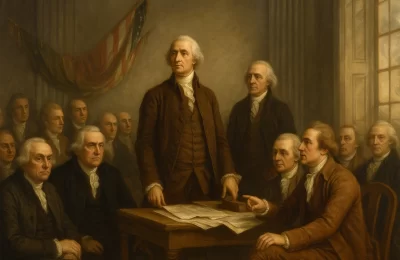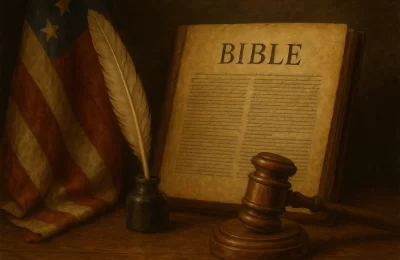Series: The Church and Public Policy
Scripture Focus: Romans 13:1–2
What happens when there is no government? History gives us glimpses. After the fall of regimes in places like Somalia in the 1990s or Haiti more recently, society fractured into chaos as gangs, warlords, and violence filled the vacuum. At the opposite extreme, consider North Korea, where a totalitarian state watches every move and demands ultimate loyalty. One collapses into anarchy, while the other smothers under tyranny.
Both scenarios raise the same question: What is government actually for?
Modern politics often swings between extremes. Some argue for a government that controls every detail of life, while others dream of a world with no government at all. Neither vision fits the biblical picture.
Romans 13:1–2 reminds us that government is neither a necessary evil nor a human invention. It is part of God’s plan. Paul writes: “Let every person be in subjection to the governing authorities. For there is no authority except from God, and those which exist are established by God.”
That statement has been misused throughout history, sometimes to prop up oppressive regimes and at other times to excuse corruption. But Paul’s point is clear. Authority itself is not an accident. Government, at its core, is God’s servant designed to restrain evil and preserve order.
Before we can debate policies or parties, we must answer the deeper question: What does God say about the role of government?
Romans 13:1–2 is one of the most direct and, at times, most debated passages on the nature of government:
“Let every person be in subjection to the governing authorities. For there is no authority except from God, and those which exist are established by God. Therefore he who resists authority has opposed the ordinance of God, and they who have opposed will receive condemnation upon themselves.” (LSB)
Authority Established by God
Paul begins with a sweeping statement. Every authority that exists is established by God. Human rulers may imagine that they sit on their thrones by personal ambition or political strategy, but Scripture tells a different story. Daniel 2:21 says that God “removes kings and establishes kings.” Behind every election, dynasty, or empire stands the sovereign hand of God.
This does not mean every ruler is righteous. Pharaoh was raised up to show God’s power (Exodus 9:16). Nebuchadnezzar was humbled to learn that the Most High rules the kingdoms of men (Daniel 4:32). Even Pilate, who handed Jesus over to be crucified, was told by Christ himself, “You would have no authority over Me, unless it had been given you from above”(John 19:11). Authority is legitimate not because rulers are good, but because God is supreme.
Government as Servant
Later in Romans 13, Paul calls governing authorities “ministers of God” (vv. 4, 6). The Greek word diakonos is the same root used for deacons in the church. The point is striking: government is not ultimate, but it is functional. Its God-ordained purpose is to restrain evil and promote good.
When the government fulfills that calling, it is a blessing. Order is better than anarchy, justice better than mob rule. The restraint of evil is part of God’s common grace, holding back the full outbreak of human sin.
Submission and Its Limits
Paul commands believers to “be in subjection.” This is not blind obedience. It is the recognition that government holds a God-given role, and Christians are not free to disregard it whenever convenient. Paying taxes, honoring rulers, and obeying laws are expressions of obedience to God’s order (Romans 13:6–7; 1 Peter 2:13–17).
Yet Scripture also shows the limits. When rulers command what God forbids, or forbid what God commands, believers must obey God rather than men (Acts 5:29). Submission is the default, but allegiance to Christ is ultimate. Government is God’s servant, not God himself.
The Balance of Hope and Realism
Romans 13 gives us a realistic but hopeful vision. Government will never bring paradise, yet neither is it outside God’s plan. It restrains evil but cannot redeem sinners. It preserves order but cannot usher in the kingdom of God. That is why Christians are called to respect rulers, pray for them (1 Timothy 2:1–2), and live peaceably under their laws, all while remembering that our citizenship is in heaven (Philippians 3:20).
Paul’s words strip away illusions. We must not despair when rulers are corrupt, for God still reigns. We must not idolize political power, for government is only a servant. The balance is this: respect the servant, worship the King.
The clash between God’s design for government and man’s ambitions is nothing new. Every society wrestles with the same questions: What belongs to Caesar, and what belongs to God?
In 2025, the case Roake v. Brumley highlighted that tension. Louisiana passed a law requiring the Ten Commandments to be displayed in every public school classroom. Supporters saw it as a way of affirming moral truth. Opponents viewed it as state coercion in matters of faith. The federal appeals court struck it down, ruling that such displays crossed the constitutional line.
Reactions to the case were predictable. Some Christians lamented that removing the Ten Commandments erases God from the public square. Others welcomed the ruling as a safeguard for religious liberty, warning against confusing the role of government with the role of the church.
Romans 13 helps us think more clearly. Government is not tasked with making disciples, but with restraining evil and maintaining order. When civil rulers attempt to legislate worship or compel religious practice, they step beyond their God-given sphere. Abraham Kuyper called this sphere sovereignty—the idea that God has appointed different realms of authority (family, church, state), each accountable to Him, none meant to absorb the others.
The problem with Louisiana’s law was not the Ten Commandments themselves, which remain holy and good. The problem was that the government could not coerce reverence. The moment it tries, the line between Caesar and Christ blurs, and both the state and the church are weakened.
This does not mean Christians retreat from public life. Believers should desire just laws, moral clarity, and wise rulers. But we must never confuse the government’s calling with the mission of the gospel. One can restrain evil; only the other redeems sinners.
When Christians understand the role of government biblically, we are freed from two dangerous temptations: despair when laws fall short, and idolatry when governments pass laws we like. The task of government is limited but real, temporary yet necessary. As Paul says, it is God’s servant—not God himself.
Paul’s teaching on government is not abstract political theory. It is discipleship. To “be in subjection” to governing authorities is not about blind loyalty; it is about recognizing God’s order in a fallen world and living wisely under it.
For the Christian, this means cultivating three habits.
1. Respect authority without worshiping it. Government deserves honor, but not ultimate allegiance. Romans 13:7 calls us to pay what is due—taxes, respect, honor—while remembering that worship belongs to God alone. This balance keeps us from both cynicism and idolatry.
2. Pray for leaders. In 1 Timothy 2:1–2, Paul urges that “entreaties and prayers, petitions and thanksgivings, be made on behalf of all men, for kings and all who are in authority.” We may not like every law or leader, but prayer transforms our posture. It reminds us that even flawed rulers serve under a sovereign God.
3. Live as good citizens. Submission is expressed not just in avoiding rebellion, but in practicing integrity—obeying laws, paying taxes honestly, and showing courtesy in public discourse. Christians should be known as those who honor authority, even as we hold it accountable.
In every generation, discipleship involves this tension: honoring government as God’s servant, while remembering that it is temporary and limited. When we live this way, we reflect Christ’s humility before Pilate and Daniel’s faithfulness before Babylon. We show a watching world that our ultimate hope is not in the rise or fall of nations, but in the reign of King Jesus.
Government can feel distant, frustrating, or overwhelming. But Romans 13 reminds us that our response is part of discipleship.
This week, take three steps:
- Pray by name for your leaders. Whether local council members, your governor, or national officials, lift them before God. Ask Him to give them wisdom and courage to serve justly.
- Practice respect in conversation. When politics comes up, resist the temptation to speak with contempt. Show that your honor for authority is rooted in Christ, not in party loyalty.
- Live with integrity as a citizen. Pay your taxes honestly, follow the law faithfully, and show kindness in civic life. Let your obedience reflect your submission to God.
You cannot control the direction of nations, but you can control the posture of your heart. Government is God’s servant. Treat it as such—not with idolatry, not with disdain, but with trust in the King who rules above every throne.
Series Navigation
- Previous Post (Aug 5): Religious Freedom: A Biblical Defense (Galatians 5:1)
- Next Post (Aug 19): When Caesar Demands Worship: Faithful Disobedience (Acts 5:29)
- View All: Facing the Issues: A Christian Worldview for a Confused Age
Takeaway Truths
- Authority comes from God. Every ruler, good or bad, holds office by God’s sovereign hand.
- Government is God’s servant. Its purpose is to restrain evil and preserve order, not to save or redeem.
- Respect with perspective. Christians honor rulers as God’s servants but worship Christ alone as King.
Live it out. Share the truth. Walk with courage.








